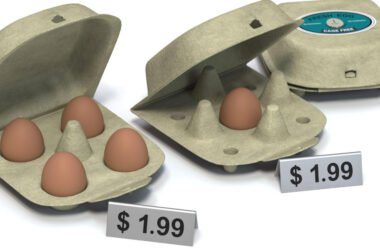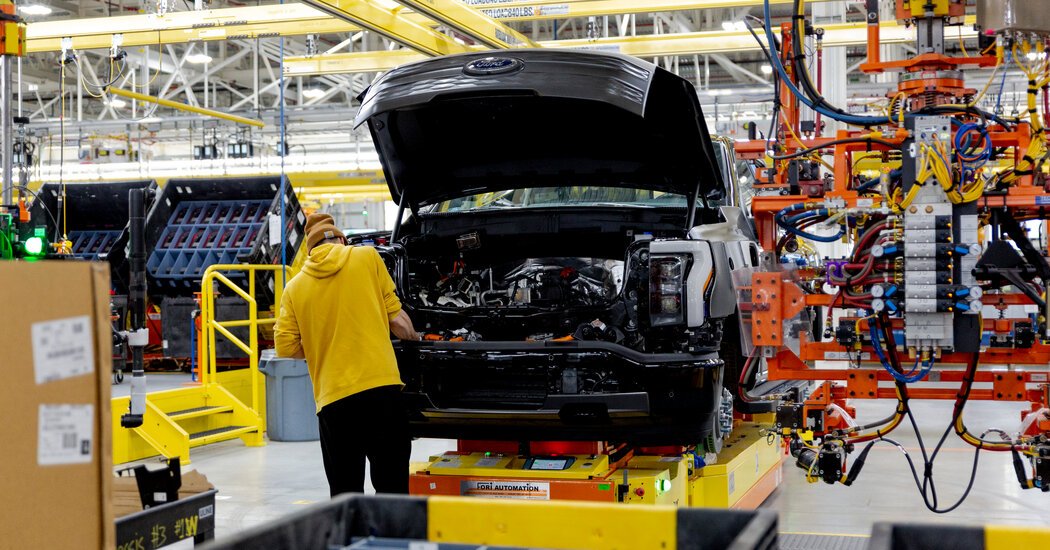The Biden administration has put forth new regulations intending to increase the production of electric vehicle batteries and their powering materials in the United States, in an effort to strengthen a strategic industry currently dominated by China.
These regulations are designed to limit the involvement of Chinese companies in supplying materials for electric vehicles that qualify for federal tax credits. They will also discourage companies seeking federal funding to construct battery factories in the United States from obtaining materials from Chinese partners.
These regulations might provoke concerns among automakers who heavily depend on China for materials and electric vehicle components. As they endeavor to retool their factories for electric car production, they face significant cost pressures, and China offers some of the most advanced and competitively priced battery technology globally.
The Biden administration aims to leverage billions of dollars in new federal funding to transform this situation and establish a US supply chain for electric vehicles, using both incentives and deterrents.
President Biden’s 2022 climate law includes up to $7,500 in tax credits for consumers who purchase electric vehicles manufactured in the United States using predominantly domestic materials. The law also includes a general ban on Chinese products. Legislators mandated that companies in China, Russia, North Korea, and Iran be barred from providing specific materials to vehicles that receive these tax breaks.
However, the law has left some questions unanswered, such as the definition of a Chinese or Russian company. Administration officials have stated that these definitions encompass any entity incorporated or headquartered in China or Russia, as well as any firm with 25 percent of board seats or equity interest held by the Chinese or Russian governments.
The law also mandates that battery makers entering into contracts or licensing agreements with Chinese companies ensure that they retain certain rights over their projects. This provision aims to prevent a Chinese company from effectively controlling such a project.
Certain conservative lawmakers had contested Ford Motor’s intention to license technology from the Chinese battery giant CATL for a plant in Marshall, Mich., arguing that such a partnership should not qualify for federal tax credits.
In November, Senator Joe Manchin III, a West Virginia Democrat, urged the Treasury Department in a letter to adopt the “strictest possible standards” to bar Chinese companies from the incentive programs.
The regulations will come into effect for battery components in 2024, and for critical minerals such as lithium, cobalt, and nickel in 2025. They will be subject to public feedback for several weeks and could be adjusted based on industry input.
Auto industry lobbyists have cautioned that excessively stringent regulations could impede electric vehicle sales. However, General Motors’ CFO, Paul Jacobson, stated that the company has structured its electric vehicle operations to succeed irrespective of federal regulations.
“We’re not anchoring the business on saying this has to happen” with respect to regulations, Mr. Jacobson told reporters on Thursday. If regulations change, he added, “it’s not a backbreaking thing for us.”
The administration has indicated that it will offer temporary exemptions until 2026 to the stringent sourcing requirements for less valuable battery components that are currently challenging for automakers to trace.
Wally Adeyemo, the Deputy Secretary of the Treasury Department, stated in a briefing with reporters that these regulations will advance the administration’s goals of developing an American clean energy supply chain and reducing emissions in the transportation sector.
“Automakers have already adjusted their supply chains to ensure buyers are eligible for these credits,” he said. “These changes take time, but companies are making the investments and Americans are buying these cars.”
In the past year, companies have invested $213 billion in manufacturing and deploying clean energy, clean vehicles, building electrification, and carbon management technology in the United States, marking a 37 percent increase from the previous year, according to tracking by the Rhodium Group and the Center for Energy and Environmental Policy Research at the Massachusetts Institute of Technology.
Companies are also investing in factories and technologies aimed at producing the materials required for electric vehicle batteries and other components, including in North Carolina, where several firms are attempting to revive the lithium industry.
Eric Norris, the President of energy storage at Albemarle Corporation, the world’s largest lithium producer, stated in an interview this week that the regulations of the Inflation Reduction Act make the lithium produced by his company in the United States more valuable.
“In fact, one could argue that the product even has a premium value relative to product sourced from Asia because it enables a financial benefit that otherwise wouldn’t exist,” Mr. Norris said.
Nonetheless, the global electric vehicle industry remains heavily reliant on China, which is the world’s biggest producer and exporter of electric vehicles. China accounts for approximately two-thirds of the world’s battery cells and refines the majority of the minerals crucial to powering electric vehicles.
John Podesta, a senior White House adviser on clean energy, mentioned on Wednesday that China processes a majority of lithium and cobalt, as well as almost 90 percent of global graphite, “and they completely outpace the U.S. and our allies on the production of batteries and their components.” However, he stated that due to the administration’s investments, “we’re rewriting that story.”
China’s dominance of critical mineral supply chains has raised concerns that Beijing might move to isolate the United States from materials crucial for not just cars but also jet engines and munitions.
Others have voiced concerns about substandard working conditions, the use of child labor, and lackluster environmental practices in critical mineral supply chains involving countries like the Democratic Republic of Congo and Indonesia.
Companies establishing mining, refinery, and battery production operations in the United States and allied nations will be required to adhere to significantly higher labor and environmental standards, and meeting these requirements will come at a cost, according to Bryce Crocker, the CEO of Australian mining company Jervois.
Jervois had been constructing the only cobalt mine in the United States, located in Idaho. However, the company halted construction in March following a substantial drop in the global cobalt price. Mr. Crocker attributed the decline to an influx of cobalt produced by Chinese-owned companies heavily subsidized by the state.
Mr. Crocker mentioned on Thursday that the Treasury Department’s regulations could impact his business, but they are awaiting the government’s guidance.
Battery manufacturers in Japan and South Korea have also been anticipating the regulations as their supply chains are frequently closely integrated with China’s.
The regulations also seem to forbid automakers from sourcing nickel used in their batteries from Russia, which is one of the world’s largest nickel producers.
One of the challenges for automakers will be implementing systems to trace all the components of their batteries through a lengthy and often opaque supply chain.
Todd Malan, the Chief External Affairs Officer for Talon Metals, seeking approval for a nickel mine in Minnesota, stated that stringent regulations could help prevent “mineral laundering” schemes in which Chinese or Russian minerals are routed through facilities in more favorable countries.
The regulations would need to be enforced through audits and the recovery of awards if companies breach them. Firms would also need to adopt “know your supplier” systems to track inputs from mines through to recycling programs, Mr. Malan added.
The Treasury Department announced that vehicles reported incorrectly would result in deductions from an automaker’s eligibility for tax credits, and automakers engaging in fraud or intentionally disregarding the rules could be deemed ineligible for future credits.








